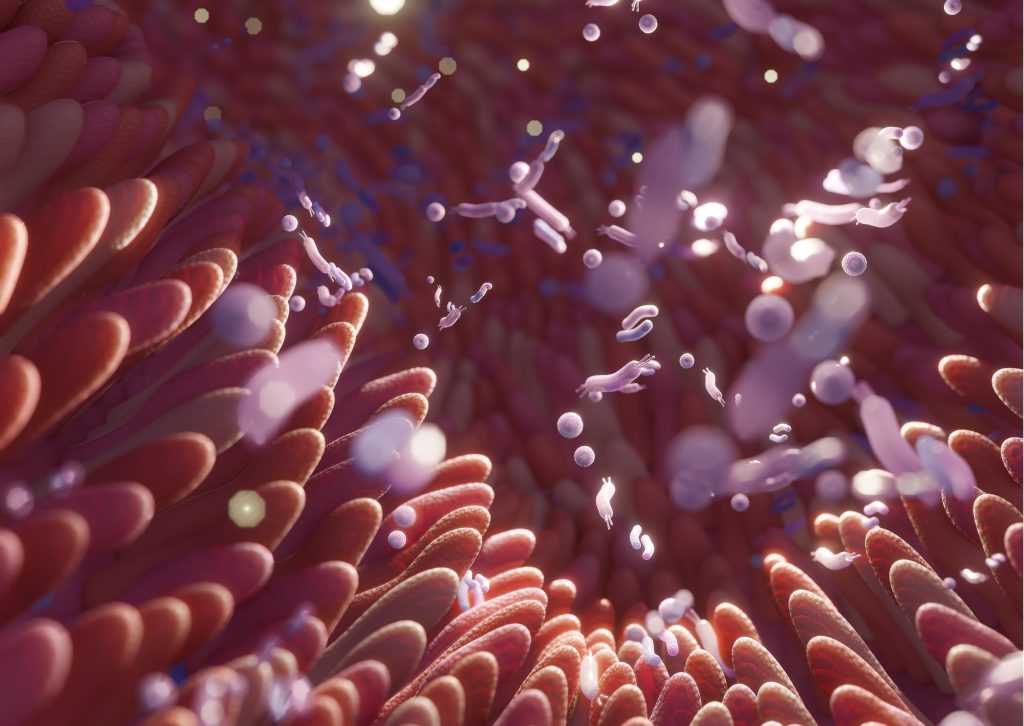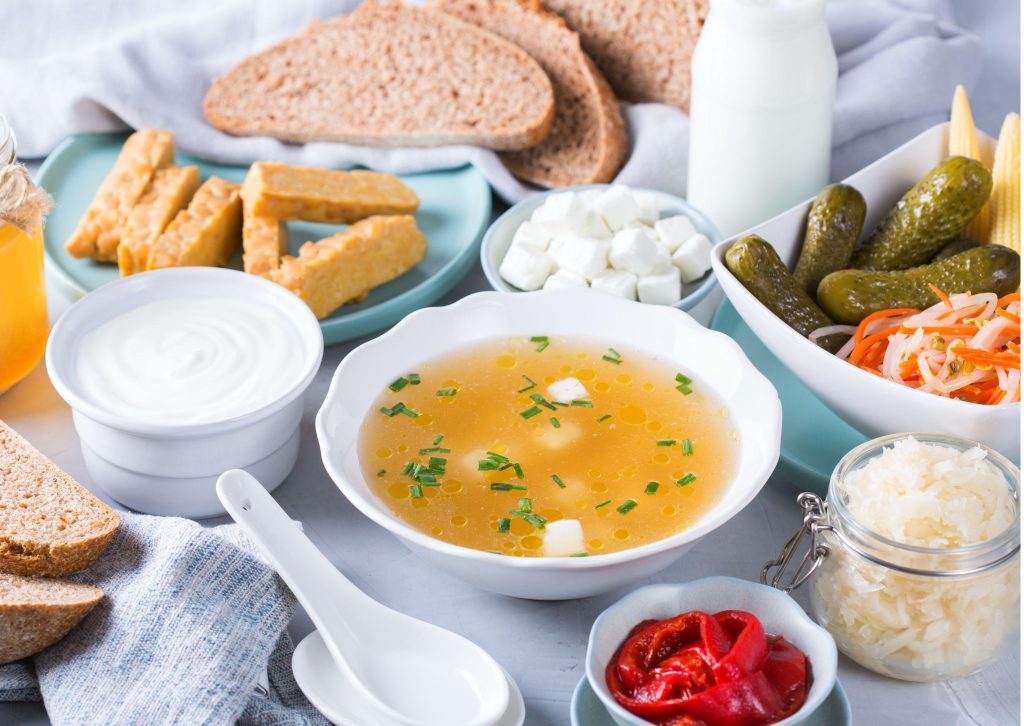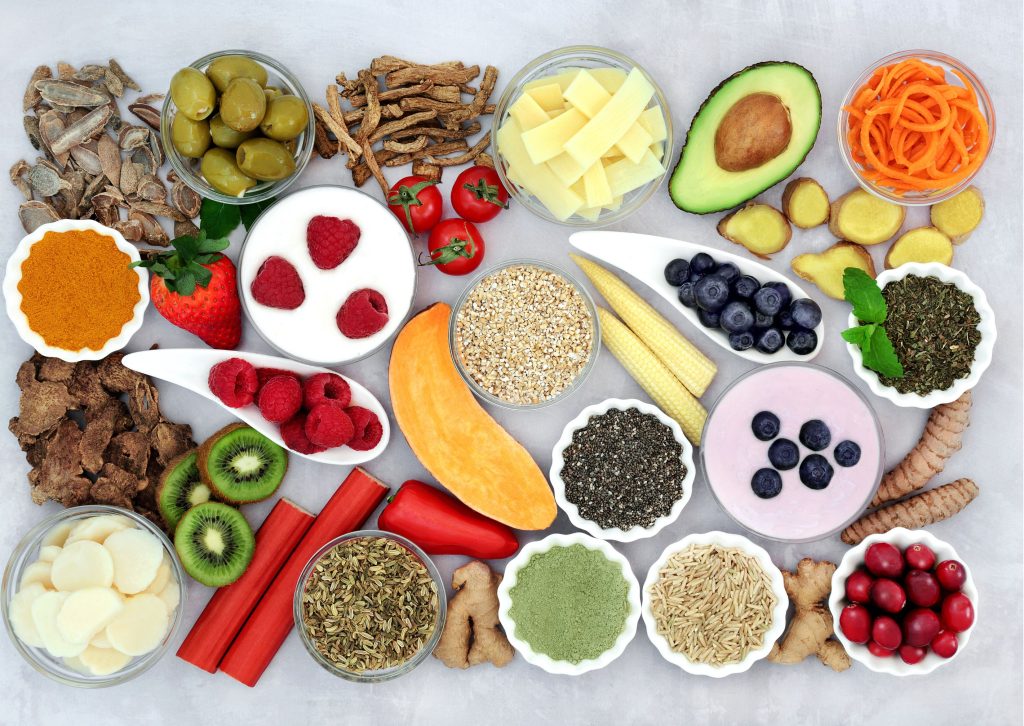
Microbiome – superorganism!
For centuries, the focus was solely on the study of the pathogenic properties of microorganisms. However, how to shows the presence of microbes on the surface as well inside our body does not necessarily mean a state that deviates from physiology. Both skin and mucous membranes of organs such as: nose, mouth, genitals and digestive system are naturally colonized by various microorganisms. The ratio of the number of bacterial cells to the cells of the human body is as much as 1.3:1. Means that the number of bacterial cells inhabiting our the body exceeds the number of human cells. These beneficial bacteria – this whole magical environment we call the MICROBIOME. Most microorganisms almost 99% are found in the large intestine. Symbiosis between living microorganisms in the lower part of the digestive system and humans
is so significant that many scientific circles consider the MICROBIOTE of the intestine to be a “superorganism”.

The gut microbiome is extremely important for human health and plays a key role in many physiological processes. Here are some important aspects of the gut microbiome:
- Digestion and metabolism: The gut microbiome helps break down some difficult-to-digest nutrients, such as fiber, which is not digestible by humans. The microorganisms in the intestines produce enzymes that speed up the digestive process and release nutrients that can be absorbed by the body.
- Immune system: The gut microbiome plays a key role in regulating the immune system. It helps in the development and maintenance of the body’s immune capacity, as well as in the prevention of excessive immune reactions, such as allergies and autoimmune diseases.
- Vitamin production: Some bacteria present in the gut microbiome are capable of producing vitamins, such as vitamin K and some B vitamins. These vitamins are important for our health and body function.
- Protective barrier: The gut microbiome plays a role in maintaining the protective barrier in the gut. By colonizing the intestinal surface, microorganisms help block the invasion of pathogens and competitively displace them from the intestinal space.
- Communicating with the brain: The gut microbiome can communicate with the brain via the gut-brain axis. What happens in the gut can affect brain functions such as mood, behavior and cognition.

Gut microbiome imbalances, known as gut dysbiosis, can be associated with a variety of diseases and health conditions, such as inflammatory bowel diseases, obesity, diabetes, allergies, autoimmune diseases, and mental disorders.
To keep our microbiome healthy – and therefore our body too:
- Remember to eat a varied diet: Eating a variety of high-fiber foods, such as fruits, vegetables, whole grains, legumes, nuts and seeds, can support the health of the gut microbiome. Fiber is the preferred food source for beneficial gut bacteria.
- Probiotics: Consuming probiotic-rich foods, such as yogurt, kefir, sauerkraut, kimchi, and pickled cucumbers, can deliver beneficial microbes to your gut and help support a healthy microbiome. Probiotics are live microorganisms that have health benefits.
- Avoiding overuse of antibiotics: Antibiotics can destroy not only harmful bacteria but also beneficial microorganisms in the gut. If you need to take antibiotics, it is worth consulting with your doctor to discuss potential supportive measures, such as probiotic supplementation.
- Reducing sugar and processed foods: high consumption of sugar and processed foods can negatively impact the balance of your gut microbiome. Try to limit your sugar intake and choose fresh, unprocessed foods.
- Regular Physical Activity: Regular physical activity can support the health of your gut microbiome. Research suggests that exercise may affect the diversity and composition of microorganisms in the gut.
- Healthy Lifestyle: Avoiding stress, getting enough sleep and staying hydrated can also contribute to maintaining a healthy gut microbiome.
- Considering supplementation: In some cases, such as after antibiotic treatment or existing health problems, it may be advisable to consider probiotic supplementation. However, it is worth consulting a doctor or nutritionist before starting supplementation, because every body is different 🙂


I, supporting my microbiome, daily supplement probiotics (in capsules), drink kombucha. I remember to eat a lot of vegetables and fruits and not forget about pickled cucumbers (which I love ;)). I don’t eat processed food (preservatives, conditioners, dyes, etc.), and I avoid fast food.
My body in return gives me strength, energy and happiness 🙂
And I’m not sick!

Sources:
- https://www.researchgate.net/profile/Anna-Kiersztan/publication/338592322_The_role_of_gut_microbiota_in_the_pathogenesis_of_neuropsychiatric_and_neurodegenerative_diseases/links/5e7375c8299bf1571848db12/The-role-of-gut-microbiota-in-the-pathogenesis-of-neuropsychiatric-and-neurodegenerative-diseases.pdf
- https://journals.viamedica.pl/gastroenterologia_kliniczna/article/view/49870
- https://web.s.ebscohost.com/abstract?direct=true&profile=ehost&scope=site&authtype=crawler&jrnl=17322693&AN=141974902&h=%2bHPDuXSrdm9yGNwR6ULxejWqOYyiPCm6AcjzfL8nVdSL534ndx7ewgGtPyhV30l71I34zihSOpXO%2bXmBOTovJQ%3d%3d&crl=c&resultNs=AdminWebAuth&resultLocal=ErrCrlNotAuth&crlhashurl=login.aspx%3fdirect%3dtrue%26profile%3dehost%26scope%3dsite%26authtype%3dcrawler%26jrnl%3d17322693%26AN%3d141974902
- https://phmd.pl/resources/html/article/details?id=206958&language=pl
- https://agro.icm.edu.pl/agro/element/bwmeta1.element.agro-9f6f534f-ec8c-4c38-aa54-45c71fed3bbf




